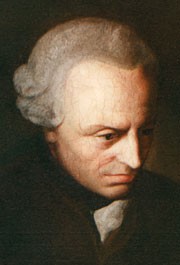Scientists and philosophers are using new discoveries in neuroscience to question the idea of free will. They are misguided, says Martin Heisenberg. Examining animal behaviour shows how our actions can be free.
Our influence on the future is something we take for granted as much as breathing. We accept that what will be is not yet determined, and that we can steer the course of events in one direction or another. This idea of freedom, and the sense of responsibility it bestows, seems essential to day-to-day existence.

Yet it is under attack as never before. Some scientists and philosophers argue that recent findings in neuroscience — such as data published last year suggesting that our brain makes decisions up to seven seconds before we become aware of them — along with the philosophical principle that any action must be dependent on preceding causes, imply that our behaviour is never self-generated and that freedom is an illusion1,2,3.
This debate has focused on humans and 'conscious free will'. Yet when it comes to understanding how we initiate behaviour, we can learn a lot by looking at animals. Although we do not credit animals with anything like the consciousness in humans, researchers have found that animal behaviour is not as involuntary as it may appear. The idea that animals act only in response to external stimuli has long been abandoned, and it is well established that they initiate behaviour on the basis of their internal states, as we do.
Before going into behaviour, I would like to take a step back and look at the nature of freedom and determinism at a more fundamental level. Almost 100 years ago, quantum physics eliminated a major obstacle to our understanding of this issue when it disposed of the idea of a Universe determined in every detail from the outset. It uncovered an inherent unpredictability in nature, in that we can never know precisely at a given moment all properties of a particle — such as both its position and its momentum.

How is this reflected at the level of everyday experience? At the scale of planets, quantum effects give way to the deterministic laws of classical mechanics. At an intermediate scale, however, they are occasionally amplified to become observable, for example when we measure radioactive decay. In general, life is an interplay between the deterministic and the random. There is plenty of evidence of chance at work in the brain: take the random opening and closing of ion channels in the neuronal membrane, or the miniature potentials of randomly discharging synaptic vesicles. Behaviour that is triggered by random events in the brain can be said to be truly 'active' — in other words, it has the quality of a beginning.
Evidence of randomly generated action — action that is distinct from reaction because it does not depend upon external stimuli — can be found in unicellular organisms. Take the way the bacterium Escherichia coli moves. It has a flagellum that can rotate around its longitudinal axis in either direction: one way drives the bacterium forward, the other causes it to tumble at random so that it ends up facing in a new direction ready for the next phase of forward motion. This 'random walk' can be modulated by sensory receptors, enabling the bacterium to find food and the right temperature.
What this tells us is that behavioural output can be independent of sensory input. This is in line with the fact that in the early development of individual organisms the motor system slightly precedes the sensory system. The same may have been true in evolution, as merely being dispersed in space should have been advantageous and should have favoured mobility.
What of more complex behaviour? With the emergence of multicellularity, individual cells lost their behavioural autonomy and organisms had to reinvent locomotion. Behaviours in complex organisms typically come in modules: the grasp reflex of the newborn, the syllables of birdsong, the rhythmic motion of the legs during walking. Some modules, such as the heartbeat, last from embryonic development until death; others, such as the snapping of a crocodile's jaw, last just fractions of a second. Some can take place in parallel, like walking and singing; others are mutually exclusive, such as sleeping and playing the piano. Some necessarily follow one another, like flight and landing. From beginning to end, the lives of animals and humans are an ongoing interweaving of these behavioural modules.
There is plenty of evidence that an animal's behaviour cannot be reduced to responses.
As with a bacterium's locomotion, the activation of behavioural modules is based on the interplay between chance and lawfulness in the brain. Insufficiently equipped, insufficiently informed and short of time, animals have to find a module that is adaptive. Their brains, in a kind of random walk, continuously pre-activate, discard and reconfigure their options, and evaluate their possible short-term and long-term consequences.
The physiology of how this happens has been little investigated. But there is plenty of evidence that an animal's behaviour cannot be reduced to responses. For example, my lab has demonstrated that fruit flies, in situations they have never encountered, can modify their expectations about the consequences of their actions. They can solve problems that no individual fly in the evolutionary history of the species has solved before. Our experiments show that they actively initiate behaviour4. Like humans who can paint with their toes, we have found that flies can be made to use several different motor outputs to escape a life-threatening danger or to visually stabilize their orientation in space5.
Does this tell us anything about freedom in human behaviour? Before I answer that, let's establish what I mean by freedom. One acknowledged definition comes from Immanuel Kant, who resolved that a person acts freely if he does of his own accord what must be done. Thus, my actions are not free if they are determined by something or someone else. As stated above, self-initiated action is not in conflict with physics and can be demonstrated in animals. So, humans can be considered free in their behaviour, in as much as their behaviour is self-initiated and adaptive.
Some define freedom as the ability to consciously decide how to act. I maintain that we need not be conscious of our decision-making to be free. What matters is that our actions are self-generated. Conscious awareness may help improve our behaviour, but it does not necessarily do so and is not essential. Why should an action become free from one moment to the next simply because we reflect upon it?
Kant's famous 'Third Antinomy' in his Critique of Pure Reason (1781) sees us on the one hand determined by natural law and on the other free because of our capacity to obey moral law. He would have been delighted to see this dilemma solved by quantum physics and behavioural biology.
References
Soon, C. S. Nature Neurosci. 11, 543–545 (2008).
Libet, B. Behav. Brain Sci. 8, 529–566 (1985).
Wegner, D. M. The Illusion of Conscious Will (MIT Press, 2002).
Heisenberg, M. Naturwissenschaften 70, 70–78 (1983).
Heisenberg, M. & Wolf, R. Vision in Drosophila in Studies of Brain Function Vol. XII, (ed. Braitenberg, V.) (Springer, 1984).
Author information
Authors and Affiliations
Rights and permissions
About this article
Cite this article
Heisenberg, M. Is free will an illusion?. Nature 459, 164–165 (2009). https://doi.org/10.1038/459164a
Published:
Issue Date:
DOI: https://doi.org/10.1038/459164a
This article is cited by
-
Evolutionary Perspective on Human Cognitive Architecture in Cognitive Load Theory: a Dynamic, Emerging Principle Approach
Educational Psychology Review (2023)
-
Austrian Economics and Compatibilist Freedom
Journal for General Philosophy of Science (2023)
-
Consciousness, decision making, and volition: freedom beyond chance and necessity
Theory in Biosciences (2022)
-
Can Reasons and Values Influence Action: How Might Intentional Agency Work Physiologically?
Journal for General Philosophy of Science (2021)
